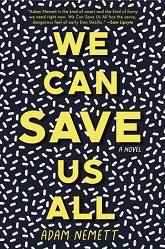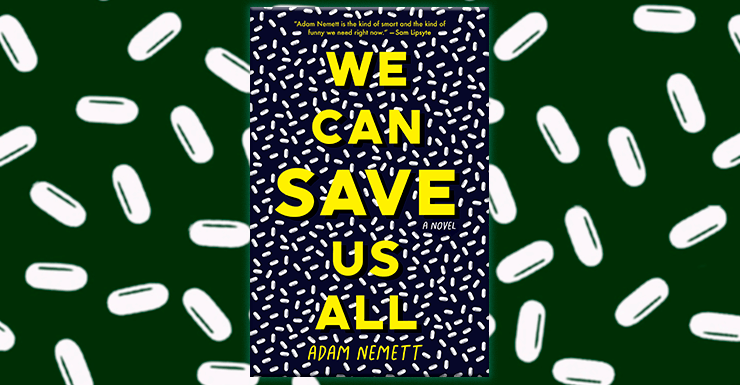If there’s not an official sub-genre for “edgy, dissolute fantasy set at elite American universities,” we should step into the void and name it ourselves. Ivorypunk. GrimIvy. Because, let’s face it—the New England university setting is an immensely popular secondary world. Think of remote towns filled with disengaged, drug-addled youths: screwing their brains out, dodging classes, lazily committing felonies, also as part of their search for some sort of greater existential purpose. Add a touch of fantasy into the mix and the metaphoric stew gets all the thicker. From The Secret History to The Magicians (and the former is a fantasy novel, bring it), there’s a long, quasi-nihilistic-and-deeply-enjoyable tradition of reading about America’s best and brightest, snorting and bonking their way through a Quest for Meaning.
We Can Save Us All is the latest entry to this tradition. All the Bacchanalian misadventures and soul-searching, but, this time, caped and cloaked as superheroes. Adam Nemett’s debut novel features a group of disillusioned and dissolute Princeton students, groping around for their place in the universe. Our ostensible hero is David Fuffman, a sort of bearded (neckbearded, in fact!) everygeek. Committed to a (largely conceptual) love of comic books, romantic angst and the “cooler” parts of his grandfather’s wardrobe, David’s an oddball, even by Princeton standards.
David achieves Swingers-like levels of awkwardness: he’s a character that will cut uncomfortably close to the bone for many readers. He’s a Nice Guy, and his quest for enough friend-points to unlock the lootcrate of woman is both eerily accurate and deeply discomfiting. David’s convinced that his role in the universe is to be the Unappreciated Hero. He’s a lost soul coming to terms with the fact that he’s no longer the smartest person he knows, and, because of it, he’s petrified of fading into the background. He’s unappreciated and out of place—ironic, as, to the reader, it is clear that the gently-padded incubator of his university is exactly where he belongs.
After an ambitious Halloween-related scheme goes horribly awry, David is searching—literally now—for a place to belong. Like many unappreciated, frustrated young men harboring a grievance, he falls into the path of a charismatic leader: the mysterious Mathias Blue. Blue is also a student, kind of. Blue is more like a rich cult leader, living off campus in the “Egg” and urging his (all male, all frustrated) band of cronies to achieve greatness with their increasing abstract and bewildering “thesis” projects. Mathias—confident, assertive—is a compelling role model for the socially floundering, and it is easy to see how David and the others fall into his orbit. When David proposes that the Egg’s residents reposition themselves and put their “theses” into action as superheroes, it is the realisation of all their dreams.
Buy the Book


We Can Save Us All
It is important to note that, although David’s personal crises dominate the book, there’s a lot going on in the background. We Can Save Us All is a (often literal) blizzard of disasters. The weather is genuinely apocalyptic, wars and crises are taking place on an international scale, and time itself is inexplicably unravelling. It is all going terribly, terribly wrong. To give Nemett credit, the apocalyptic backdrop is just that: a backdrop. Those looking for a hard-science explanation of “Chronostrictesis” will be sorely disappointed. The horrors and disasters and armageddons are all off-screen things: they exist to reinforce the correspondingly microcosmic focus of David, Mathias, and the others.
And make no mistake: this is a book wholly about self-absorption. Nemett treads a skillful, and increasingly uncomfortable, line between sympathy and condemnation, as our “heroes”—a band of self-created, self-entitled goofballs—set out to save the day. They are unappointed and, in many ways, unwanted: the adventures of these clumsy Avengers are as much about creating problems as they are solving them. David and his ilk are so shockingly self-entitled that they believe disaster exists to give them a sense of purpose. They are so keen to be saviours that they’re not really bothered about who, what or even why they’re saving. They are privilege at its peak: firm believers that the universe is ending solely to give them a reason to pronk about in capes.
It is Haley Roth—another Princeton student, who David also knew in high school—that steals the show. She’s an emotional counterbalance to the Egg’s pretentious young men and grounds the book in reality. Haley’s faced real tragedy, real loss, and been a real outcast. She’s as talented, if not more so, than Mathias and his band, but is constantly forced to operate in parallel, or to carve out her own place. Her uphill struggle—a genuine one—is impressive. Even in high school, David is surprised that she gets into Princeton. And once at Princeton, Haley has to make her own path to Mathias et al. The underwhelming David is invited; the more skillful Haley has to “lean in.” She’s the most compelling character in We Can Save Us All, because, with the sound and fury of young privileged male malaise, Haley is quietly overcoming real problems.
We Can Save Us All—true to the others in the PrivilegePunk, TrustFundDark genre—is a hard read, using America’s “best and brightest” to describe some of society’s darkest and most self-indulgent impulses. It is a timely and horrifying look into youth radicalisation; the power of the narratives that we assign ourselves. Nemett’s clever use of the third person allows a sense of remove and of feigned objectivity. This adds to the overall sense of the reader as the ultimate judge of the characters and their actions. We Can Save Us All takes us under the skin of “heroes”—to ask questions about intent, purpose, and salvation as a whole. It is a deeply uncomfortable read, but all the more powerful for it.
We Can Save Us All is available from The Unnamed Press.
Jared Shurin is the editor of The Djinn Falls in Love, The Outcast Hours, The Best of British Fantasy, and many other published and/or forthcoming works. He writes irregularly at raptorvelocity.com and continuously at @straycarnivore.










